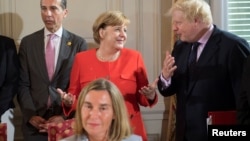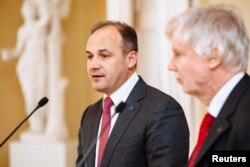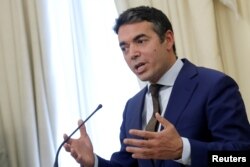Bosnia boycotted a transport pact and Kosovo frustrated a European Union attempt to forge a customs union in the Balkans on Wednesday, at a summit that once again brought promises of accession but no firm timetable.
With enlargement on hold, the EU is pushing six Balkan nations to integrate their economies in the hope of fostering development and stability, concerned over sometimes fraught relations in the region and the influence of an emboldened Russia.
But what was billed as a common market at a meeting in Sarajevo in February turned into a Regional Economic Cooperation Area in the northern Italian port city of Trieste, shorn of a full-fledged customs union. Kosovo, a former province of Serbia which depends heavily on customs revenues to top up its coffers, had objected.
Bosnia, too, failed to sign a deal on upgrading transport links due to objections from its autonomous Serb Republic, which has frustrated the country's efforts to move closer to the EU before.
The summit produced a commitment from the six to harmonize investment rules, remove non-tariff barriers to trade and essentially plug gaps and enhance a trade pact that is already in place — the Central European Free Trade Area, CEFTA.
"What has been offered to us on the table is not what was presented in February 2017," Kosovo Foreign Minister Enver Hoxhaj told Reuters.
Slowly But Surely
Before the summit, the leaders of Germany, France and Italy met on a boat moored off Trieste's Piazza Unita d'Italia. Their discussions focussed on the growing wave of migrants reaching Italy's southern shores from North Africa, and produced little new on the issue of EU enlargement to the Balkans.
German Chancellor Angela Merkel said the EU had a duty to move the region "slowly but surely" towards the bloc, more than 25 years after Yugoslavia disintegrated in war and newly-independent states emerged from the rubble.
"Political stability in the region means political stability for us too," Merkel said. "We know this from experience."
Enlargement, however, has been sidelined by crises of eurozone debt, huge migration, right-wing populism and Brexit.
Macedonia's foreign minister, Nikola Dimitrov, said Britain's departure from the EU in 2019 presented the EU with an opportunity.
"The desire of the region to join Europe is an opportunity for Europe to feel attractive," he told a civil society forum on the sidelines of the summit. "The region and its readiness to step it up and finish the job is an opportunity for Europe to show it can make a difference and that it can think big and be self-confident."
Summit host Italy warned against freezing enlargement indefinitely.
"I do not think a freeze of this process in the next 10 years could be sustainable for these countries," said Prime Minister Paolo Gentiloni, speaking in English, "and I don't think it would be helpful for the EU."







